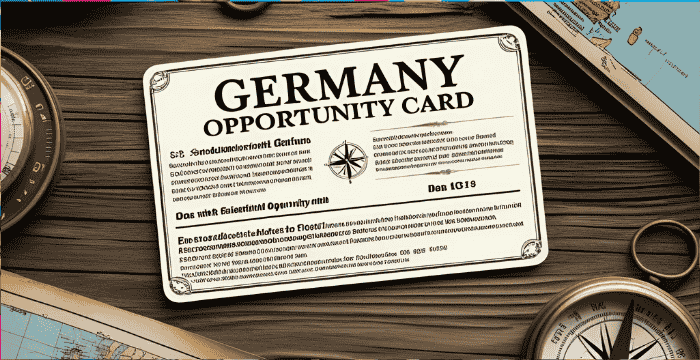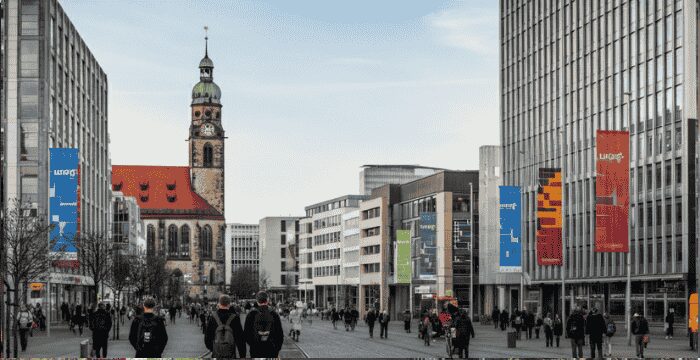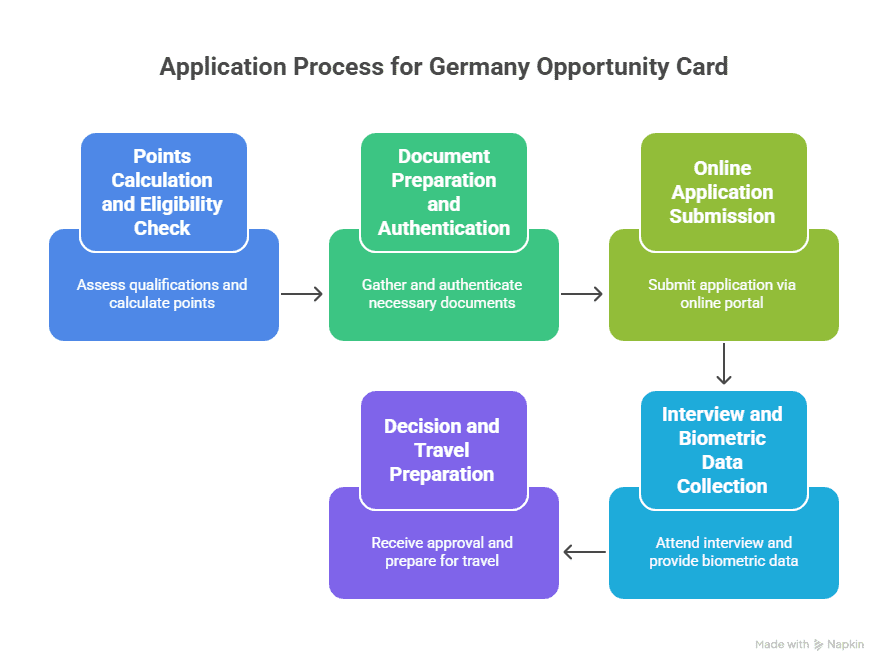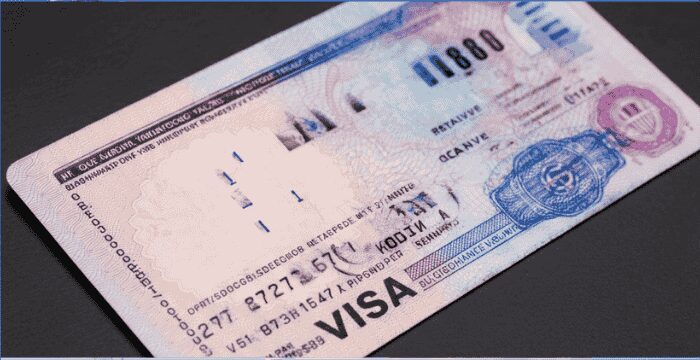Are you a qualified specialist who dreams of working in Germany and is frightened by the amount of paperwork and the list of demands? The Germany opportunity card might become your golden ticket- find out how the world of possibilities in one of the strongest economies of Europe can be opened in front of you! The Chancenkarte, which is what it is called in the German language, is considered a revolution by the way Germany is drawing international talent, and this has made it easier than ever before for any qualified workers to follow their career dreams into the economic giant. The opportunity of working in Germany is now easier as the Germany opportunity card will help open the door to a promising profession in Germany.
The Germany opportunity card began on June 1, 2024, and it represents the last step of Germany’s wide, comprehensive reform of the Skilled Immigration Act. This is a revolutionary program with the purpose of developing an immigration system for Germany based on points that is specifically tailored toward attracting highly qualified and skilled non-EU workers, and in the same way, is seen to be quite successful in Canada. More than 50,000 possible approvals per year and a doubling of quotas for Western Balkan states by 2025 have shown that Germany’s opportunity card program signifies a genuine will of a serious Germany to solve the crunching labour shortages.
The peculiarity of Germany’s opportunity card program is that it is incredibly flexible, allowing owners to remain in Germany for up to one year to seek a job, and it can be revised to two years. During such a period, job seekers are allowed to work part-time and not more than 20 hours per week, as well as take trial jobs during this time, which should not exceed two weeks. Most importantly, the opportunity card Germany can be regarded as a direct way to a long-term residence and even permanent residency status after having availed employment in qualified positions. The Germany opportunity card is soon becoming the choice of skilled professionals around the globe.
What is Germany Opportunity Card (Chancenkarte)?
- Germany opportunity cards, Chancenkarte in German, are a ground-breaking points-based visa established in 2024 that enables skilled non-EU workers to enter Germany on a one-year basis to seek qualified work. In comparison to former immigration systems, which demanded high bureaucracy and pre-offered job positions, the opportunity card Germany tests the applicants on a point-based system that takes into account education, language expertise, working experience, and a connection to Germany.
- This new trend is a big change in the customary requirements of the residence permit in Germany. The Chancenkarte does not require all the qualifications of foreign professionals to be recognised in full, and thus is more available to a wider group of foreign professionals who are willing to bring valuable skills that might not have passed lengthy credential recognition procedures. The system realises that skilled people can also add value to the German job market in a situation when people are still being tested or partially recognised.
- This new visa regime is based on the Fachkraefteteinwanderungsgesetz (Skilled Immigration Act) framework that is characterised by the urgent requirements of Germany to absorb about 400,000 skilled workers in order to fill the gap in some areas of specialisation. This legal framework gives Germany ample opportunity to work under an overall immigration policy that would invite talent globally, and the immigrant workers will be of good calibre. Germany now has the Germany opportunity card, at the same time serving as the focus of its workforce policy.
Important Advantages of the Germany Opportunity Card in 2025
Germany opportunity card has many implications that make it a favourable destination to work in Germany to skilled personnel:
- Legal stay and flexibility: The holders are permitted to be legally residing in Germany up to a year, and this can further be extended to two years under special conditions. This long period gives sufficient time to discover the job market, meet the potential employers and locate a suitable career without the pressure of having to get employed rapidly.
- No Pre-Employment Requirements: The Chancenkarte should be established in contrast to the traditional type of work visa, which implies the receipt of a job offer prior to Germany arrival. This liberty will mean that the professionals will get a chance to learn on the ground as well as face German employers during interviews by giving them a chance to prove what they can offer, as this greatly enhances their chances of getting good jobs.
- Part-time work authorisation: The Germany opportunity card gives its holder the opportunity to work part-time of not more than 20 hours per week and also work with a potential employer on a trial basis of up to two weeks. This aspect can be used to cover short-term finance related to the job search process, but also gives a good experience in the German labour market as well as enlightens applicants in this area concerning local market culture.
- A straight path to permanent settlement: After getting a qualified job, the Germany opportunity card gives a clear path to long-term residence and permanent stay. The career pathway provides not only security and long-range planning capabilities to the professionals and their families, but it is also economical.
- Low Bureaucracy: The new system has low bureaucracy levels on the new system, unlike the path it was before, and this makes it easier to travel to the concerned country. This efficiency increase makes Germany a better place in attracting foreign talent than other destinations.
| Benefit Category | Specific Advantage | Impact on Applicants |
| Duration | Up to 1 year (extendable to 2) | Extended job search time |
| Work Rights | 20 hours/week + trial jobs | Financial sustainability |
| Flexibility | No employer sponsorship required | Freedom to explore opportunities |
| Pathway | Route to permanent residence | Long-term security |
| Process | Streamlined application | Faster entry to Germany |
The Germany opportunity card is the means to ensure that skilled immigration is as easy and painless as possible, so that Germany does not lose out in the global talent gold rush.
Who is Eligible for the Opportunity Card Germany?
Basic Requirements
The opportunity card Germany is an opportunity with special qualifications aimed at bringing in qualified professionals towards upholding program integrity. There are some underlying requirements that an applicant should fulfil before they can be eligible to apply under the skilled immigration Germany route.
- The Nationality Requirements: The applicants have to be citizens of non-EU countries since the Germany opportunity card program focuses on international talent not present in the European Union. The people of the EU enjoy such freedom of movement in the bloc and do not need this special type of visa.
- Educational qualifications: The miners should have two years of experience in vocational training or have a degree that is accepted in their country of origin at a university. Such a prerequisite means that the candidates must have a significant degree of professional preparation, either by academic education or practical vocational training, that conforms to international standards.
- Language Proficiency: German language requirements imply that either basic German language skills at the A1 scale or good English language skills at the B2 level are required. This linguistic basis makes sure that applicants can move freely in everyday German life and correspondingly converse with colleagues in workplaces, yet those who do so better receive bonus points in the scoring system.
- Financial Sustainability: The applicants should prove that they can sponsor themselves during their stay in Germany. This is a need to demonstrate any income-generating activity in the form of showing around 1, 027 euros monthly in the current year (2024), which may be demonstrated by the monthly statements of the bank account, blocked accounts, or an employment contract to work part time not exceeding 20 hours or less per week.
| Requirement Category | Minimum Standard | Additional Notes |
| Nationality | Non-EU citizen | EU citizens have different pathways |
| Education | 2+ years vocational training OR university degree | Must be recognised in the home country |
| Language | German A1 OR English B2 | Higher levels earn more points |
| Finances | €1,027/month minimum | Can include a part-time work contract |
| Age | No strict limit | Younger applicants score more points |
The Germany opportunity card allows only licensed and self-motivated professionals to use this new immigration program.
The Points System explained
Germany allows immigrants to apply under the points-based immigration method that entails at least 6 points out of a set of several criteria to earn an approval on the Chancenkarte status. Such a flexible methodology, of course, permits a variety of avenues to qualification in acknowledging the fact that experienced, well-trained professionals offer a variety of sets of experience, education, and ability combinations. The card points system, as laid out in the Germany opportunity card, is transparent and fair.
- Qualification Recognition Points: The confirmed foreign professional qualification or the license to practice a regulated profession (such as teaching, nursing or engineering) may yield a maximum of 4 points in recognition of partial qualifications. This type of recognition has the understanding that partial recognition shows a high level of professional competence that could be used to the advantage of the German economy.
- Language Proficiency Scoring: German language credit has significant point value, which means that German B2 or above rewards 3 points, German B1 rewards 2 points and German A2 rewards 1 point. Also, a C1 level of English language and knowledge will earn an extra 1 point, due to the fact that a lot of contemporary workplaces are international.
- Professional Experience Points: Five years of experience within the last seven years will result in the award of 3 points, whereas 2 years of experience within the last five years will be awarded 2 points. Such experience needs to be in the learned profession and with correct vocational training, and must relate to the intended Germany career path of the applicant.
- Age score: The applicants less than 35 years are privileged and are scored at 2 points, and the candidates between 35 and 40 are awarded 1 point. This is the age preference, because Germany is interested in having professionals who will take a long time to add to the workforce.
- German Connection Points: The German point is awarded if the German legal residence has taken place at least to the extent of six months in the past five years, not counting tourist stays. This is because this provision acknowledges that prior knowledge of the German society and systems avails benefits towards a successful integration.
| Points Category | Criteria | Points Awarded |
| Qualification Recognition | Partial recognition/regulated profession | 4 points |
| German Language | B2+ level | 3 points |
| German Language | B1 level | 2 points |
| Professional Experience | 5 years in last 7 years | 3 points |
| Professional Experience | 2 years in last 5 years | 2 points |
| Age | Under 35 years | 2 points |
| Age | 35-40 years | 1 point |
| Previous Germany Stay | 6+ months of legal residence | 1 point |
| English Proficiency | C1 level | 1 point |
| Spouse Application | Joint application with a partner | 1 point |
A very important ingredient in the selection of the right candidates to be allowed to immigrate to Germany through utilising the skilled immigration opportunity is the Germany opportunity card points system.
How to Apply for the Germany Opportunity Card in 2025
The Employment Process Steps
The process of application for the Germany opportunity card is structured, and it has been set with the aim of letting the qualified applicants move through the system in the most efficient manner possible. Being aware of every process, an applicant will be able to be meticulous and not be affected by delays of any sort.
- Points Calculations and Eligibility Check: The process starts with a check of your qualifications and the addition of the points with the help of official calculators or with consultants. Such screening saves resources and time that would have been utilised on applications that are not up to the minimum to fit into the opportunity card of Germany.
- Document Preparation and Authentication: Catch and collect all the necessary documents as they must comply with the German consular standards of authentication and translation. It is at this stage that the process may take the longest part of the preparation, especially when the documents are to be apostilled or copied by competent translators.
- Online: Fill out and submit your online application with the German Federal Foreign Office portal or at the German embassy/consulate in your country. Citizens of Australia, Canada, Israel, Japan, New Zealand, South Korea, the United Kingdom, and the United States are among those nationalities who can obtain their Schengen visas at the local Auslanderbehörde after entering Germany.
- Interview and Biometric Data Collection: Show up at your appointment date and time at the German mission to input your biometric data and apply the necessary fees, as well as undergo any form of interview that might be needed. This face-to-face component is even necessary in security and verification of even online applications.
- Decision and Travel Preparation: With the approval, you will get your Chancenkarte and start preparing to come to Germany, including finding an initial place of residence and knowing your rights and responsibilities as a holder of the card.
| Application Step | Timeline | Key Requirements |
| Eligibility Check | 1-2 weeks | Self-assessment tools |
| Document Preparation | 4-8 weeks | Translations, authentications |
| Application Submission | 1-2 weeks | Online or consular submission |
| Interview/Biometrics | 2-4 weeks | In-person appointment |
| Processing Decision | 4-12 weeks | Varies by consulate |
The application process of the German opportunity card is user-friendly and not difficult to enter by well-skilled people, and is designed to be smooth.
Required Documents
There is extensive documentation needed in the Germany opportunity card application so they can screen out eligibility and prove the assessment, points-based. Valid preparation of documents has a big influence on the rates of application and the time to success.
- Identification and Travel Documents: It is necessary to have a valid passport that is less than 12 months old and is valid for more than 12 months, as well as a recent biometric passports that comply with German visa conditions. The passport should contain enough blank pages, where a visa will be stamped with entry/exit marks.
- Educational Credentials: Attach photocopies of a University degree or any vocational training certificates, accompanied by the original documents (or certified duplicate copies) of official transcripts of credits or courses successfully accomplished. Such are the documents which normally need apostille document certification and a certified German or English translation by certified translators.
- Certificates of Proficiency in Language: You must submit original language proficiency certificates to show your levels of proficiency in writing and speaking German or English. Such accepted certificates are Goethe Institute certificates in German, IELTS, or TOEFL in English and other global language testing bodies.
- Work Experience Attestation: Provide full-account work references, job certificates, and evidence of previous work through which you need a profession that you are meant to acquire in Germany. Such documents are supposed to define job titles, job duties, terms of employment, and contact details of the supervisor.
- Financial Evidence: Show financial standing with either bank accounts, or blocked accounts, or part-time working contracts. The financial documents would have to prove that you have enough money to sustain yourself in Germany in the first few days without having to get any state support.
- Health Insurance Coverage: Prove that you have a valid health insurance that will cover you in Germany when you are staying there in terms of health. The insurance should be able to cover emergency medical emergencies and must meet German standards.
| Document Category | Specific Requirements | Processing Notes |
| Identity | Valid passport + photos | 12+ months validity required |
| Education | Degree/certificates + transcripts | Apostille + translation needed |
| Language | Official certificates | Goethe, IELTS, TOEFL accepted |
| Experience | Employment references | Detailed job descriptions are required |
| Finances | Bank statements/blocked account | €1,027/month minimum |
| Insurance | Health coverage proof | German standard compliance |
The documentation requirements of the Germany opportunity card are transparent and clear, thus simple to prepare by the applicants.
What Jobs Can You Do with the Opportunity Card?
The opportunity card germany offers an elastic working permit that prioritizes the freedom of searching a job with viable possibilities of earning an income. Knowledge of these work rights assists the cardholders to make the best use of their stay in Germany, while establishing long-term careers at the same time.
- Part-Time Employment Authorisation: The holder is allowed to work within the first 20 weeks of the job search up to 20 hours per week in any area, thus assuring housing during the course of the job hunt. These part-time permissions are a great advancement compared with the past visa categories that used to restrict all employment activities, even during the job search times. The applicable minimum wage standard makes it reasonable to obtain remuneration, and currently, its value is 12.41 Euros per hour worked in 2024, so as a part-time employee, the cardholder can earn more than 1,000 Euros in a month.
- Trial Employment Opportunities: Chancenkarte-The Chancenkarte allows you to test jobs for up to two weeks with possible employers offering good networking and practical demonstration experience. These trial experiences enable the employers as well as the job seekers to test compatibility before they can enter into a permanent employment relationship, effectively boosting the rate of success during hiring and the results after the job is obtained.
- Full-Time Career Transition: After obtaining a cardholder status because the cardholders were able to get qualified full-time jobs within their set of skills and education, it is possible to move to a work residence permit to stay longer. This changing procedure holds continuity in legal status without ambiguity of moving on to get permanent residence status in Germany and developing your career in Germany.
- Sector Flexibility and Opportunities: The German job market exhibits high vacancies in the areas of logistics, skilled trades, healthcare and IT professionals, and a number of areas are witnessing a high burst in the number of vacancies. As an example, warehouse logistics specialists witnessed more than 400 per cent greater demand than was observed in 2019, whereas IT security specialists saw an increase in the range of open jobs of 196 per cent.
| Work Type | Duration Limit | Sector Restrictions | Transition Options |
| Part-time | 20 hours/week | None | Continue throughout the stay |
| Trial jobs | 2 weeks maximum | None | Can lead to permanent offers |
| Full-time | After securing a position | Must match qualifications | Work residence permit |
| Self-employment | Permitted | Business registration required | Entrepreneur visa pathway |
The Germany opportunity card offers unmatched flexibility for international professionals, making it a top choice for those seeking German work opportunities.
Extension, Transition, and Long-Term Prospects for the Germany Opportunity Card
The Germany opportunity card offers structured pathways for extending stay and transitioning to permanent residence, providing security and predictability for long-term career planning. Having an idea of these progression options will assist cardholders in arriving at enlightened decisions regarding their future in Germany.
Initial Validity and Extension Possibilities: The Chancenkarte is first acceptable for a year and can be extended for two years upon particular requirements. The extension criteria normally involve the exhibited job seeking, in addition to ongoing financial viability, and adherence to the visa requirements. In case of first-time recipients, it has been suggested by some sources that the residence permit may initially be extended up to 24 months, compared to the previous history of 18 months, followed by extension up to the maximum residency period of three years.
Transition to work residence permit: If a cardholder finds a plausible work after finding a qualified work that suits his/her skills and education, he or she can get a work residence permit without leaving Germany. This uninterrupted change continues the passing of the law and the basis of the long-lasting settlement. The work residence permit usually has more stability and is less limited than the first Chancenkarte.
Pathway to Permanent Residence: The Germany opportunity card creates a clear route to permanent residency through the standard German immigration process. Having obtained a work residence permit and having fulfilled integration expectations, such as the knowledge of the German language and gainful employment, the cardholders may obtain a permanent residency (Niederlassungserlaubnis) or German citizenship, according to their long-term plans.
Family Reunification Possibilities: Successful acquisition of a transition to work residence permit creates possibilities of family reunification whereby spouses and minor children are able to accompany cardholders in Germany. New policies have also made family reunification easier, and obligations to demonstrate adequate living space that were present earlier have been eliminated.
| Progression Stage | Duration | Requirements | Benefits |
| Initial Opportunity Card | 1 year | Basic eligibility + 6 points | Job search + part-time work |
| Extended Opportunity Card | Up to 2 additional years | Continued job search efforts | Extended search period |
| Work Residence Permit | 2-4 years initially | Qualified employment secured | Full work authorisation |
| Permanent Residence | After 5+ years total | Integration requirements met | Unlimited residence rights |
| German Citizenship | After 8+ years | Language + civic knowledge | Full citizenship benefits |
The Germany opportunity card is your gateway to a lasting future in Germany, offering both flexibility and long-term security.
Comparison: Opportunity Card vs. Other German Work Visas
Understanding how the Germany opportunity card compares to other German work visa options helps applicants choose the most appropriate pathway for their circumstances and career goals. The variety of visas will cover various types of applicants and imply particular benefits and restrictions.
| Visa Type | Job Offer Required | Points System | Duration | Work Rights | Path to Permanent Residence |
| Opportunity Card | No | Yes (6+ points) | 1-3 years | Part-time + trials | Yes, after securing employment |
| Job Seeker Visa | No | No | 6 months | None | Yes, after securing employment |
| EU Blue Card | Yes | No | Up to 4 years | Full-time only | Yes, 21-33 months |
| Skilled Worker Visa | Yes | No | 2-4 years | Full-time only | Yes, after 5 years |
| Student Visa | No (study purpose) | No | Study duration | Limited part-time | Yes, after graduation + employment |
The Germany opportunity card stands out for its flexibility, lack of job offer requirement, and clear pathway to permanent residence.
Common Challenges and How to Overcome Them?
Navigating the Germany opportunity card application process presents several common challenges that can delay or complicate applications. Realising these barriers and how they can be overcome guides applicants to get ready optimally and prevent time-wasting hitches.
- Financial Proof Requirement: This is the area where the applicants find it difficult to prove that he has enough financial resources, especially in countries where there are restrictions on exchanging currencies or containment, or where financial institution services have their constraints. The housing costs are a necessity that may appear to be challenging, considering that a sum of around 11,208 euros is needed each year. Nevertheless, there are various methods of addressing this requirement. The blocked account (Sperrkonto) with German banks that are specialised in immigration activities is a viable solution as it offers a binding withdrawal of the funds, and it also shows excellent financial stability to German officials. Otherwise, it is possible to find a part-time work contract up to 20 hours per week, in order to partially meet the financial needs and have quick access to funds as soon as a work-related decision is made.
- Language Certificate Acquisition: Official language certificates according to the German standard are difficult to acquire in a country where there are few testing facilities or where they involve a time-consuming waiting time. Start to test language knowledge early enough with several language test alternatives, such as Goethe Institute certificates of German or IELTS/TOEFL of English. Some applicants benefit from online preparation courses or intensive language programs that combine learning with certification preparation, maximising efficiency in meeting German language requirements.
- Degree Recognition Problems: Degree recognition issues also affect many of the applicants, especially where they have attended learning institutions that are not highly recognised on an international scale or where their academic qualifications do not directly correlate to the German system. Before applying, it is important to use the ANABIN database (anabin.kmk.org) and find out whether or not your degree is accepted in Germany. If your qualification isn’t fully recognized, consider applying for partial recognition through the appropriate German authorities, as partial recognition can still earn valuable points in the points-based immigration Germany system.
- CV and Application Adaptation: German application standards are very different compared to other countries, as in most cases applications are to be conducted in a certain specific way, with much documentation and cultural adjustment. Study the German forms of the CV (Lebenslauf) and think of professional consultation services to deal with German applications for jobs. Most of the successful competitors have an advantage of connecting with German professionals in the area of study to learn their expectations and how to conduct themselves in professional practices.
| Challenge Category | Common Issues | Practical Solutions | Timeline Impact |
| Financial Proof | Currency restrictions, bank requirements | Blocked account, part-time contract | 2-4 weeks |
| Language Certificates | Limited test centres, waiting periods | Early planning, multiple test options | 4-8 weeks |
| Degree Recognition | Unknown institutions, partial matches | ANABIN database, partial recognition | 8-16 weeks |
| Application Format | Cultural differences, documentation | Professional consultation, networking | 2-4 weeks |
| Document Authentication | Apostille requirements, translations | Certified translators, early preparation | 4-8 weeks |
The Germany opportunity card process is manageable with the right preparation and resources.
Latest Updates & Policy Changes (2025)
The Germany opportunity card program continues evolving in 2025, with several significant policy updates that enhance opportunities for skilled immigration to Germany and streamline application processes. Being aware of these changes will assist the applicants in benefiting from the better conditions and new opportunities.
- Expanded quotas and regions: Since Germany has a high rate of integration with professionals in the Western Balkans, the country has increased the quotas for the Western Balkan nations in 2025. The growth indicates the willingness of Germany to alleviate the problem of labour shortages, but in a manner that does not compromise the quality standards of the inflowing labourers. The raised quotas are especially helpful to academicians who work in the highly demanding fields, such as IT, health care, and the skilled workforce.
- Enhancements of Digital Application Portal: The Federal Foreign Office has introduced simplified digital application procedures; this has reduced the time spent, as well as enhanced the user experience. Such technological advances are enhanced document upload systems, real-time tracking of the applications, as well as automatic eligibility pre-screening systems to help relieve the applicants of their chances of successful submission.
- Improved Family Reunification Support: There has been simplification in family reunification linked to the issuance of work residence permits to the Chancenkarte holders. Without the need for living space proofs, it would be facilitated to move as a complete family, and Germany aims to invite not only individual professionals but also complete skilled families who will be able to contribute to German society.
- Labour Market Responsiveness: The points system receives ongoing updates to reflect current German job market needs and shortage occupations. These adjustments ensure that the Germany opportunity card remains aligned with economic priorities and provides the most relevant pathways for professionals in high-demand sectors.
| Policy Area | 2025 Changes | Impact on Applicants |
| Regional Quotas | Doubled Western Balkan allocations | Increased approval chances |
| Digital Processing | Enhanced online portals | Faster application processing |
| Family Reunification | Simplified requirements | Easier family relocation |
| Points System | Regular labour market updates | Better alignment with job demand |
| Processing Times | Improved efficiency targets | Reduced waiting periods |
The Germany opportunity card continues to evolve, making it increasingly attractive for skilled professionals worldwide.
Conclusion
The Germany opportunity card represents a transformative opportunity for skilled non-EU professionals seeking to build successful careers in one of Europe’s most dynamic economies. Through its innovative points-based immigration system, reduced bureaucratic barriers, and clear pathways to permanent residence, the Chancenkarte opens doors for global talent to thrive in Germany’s robust job market. The opportunity card Germany caters for the needs of the modern professional by being flexible regarding their qualification requirements, allowing them to work as long as they look for a job and fully support unification in their family throughout their stay to serve the economic interest of the German economy. The idea of the further development of the program in 2025 and the increase in quotas, better digitalisation, and integration support services shows that Germany is willing to work on the attraction and retention of international talent.
For skilled professionals ready to take the next step in their careers, the Germany opportunity card offers an accessible, practical pathway to European opportunities. Whether you’re an IT specialist, healthcare professional, engineer, or skilled tradesperson, this program provides the framework to explore German work opportunities while building toward long-term residence and career success. There has never been a better time to get to Germany, as processes will run faster, policies will be more helpful, and the job market will be friendlier than ever before. Start your Germany opportunity card journey today and unlock your potential in Europe’s economic powerhouse.
Frequently Asked Questions(FAQs)
Q1.Can I bring my family with the Germany Opportunity Card?
Ans. Chancenkarte holders can apply for family reunification, but particular criteria have to be fulfilled according to their status and progression. In the first chance card Germany category, family members are not allowed to come along with you since this visa is meant to be applied for by individuals seeking employment. However, family reunification with the spouses and minor children is possible once you change the status to a work residence permit, once you get a job and are a qualified person. These requirements were simplified, and families can move to Germany together more easily due to the implementation of the new 2025 policy, which got rid of the need to demonstrate that one has enough living space.
Q2. Do I need to know German to apply for the Germany Opportunity Card?
Ans. Basic German language requirements include A1 level proficiency, though good English proficiency at B2 level can substitute for German skills. But to score, there are a lot more points and more chances in Germany to find a job, the more German language skills you have. German B1 level earns 2 points, while B2 or higher earns 3 points in the points-based immigration Germany system. Most of the successful candidates suggest that one should rather learn German irrespective of the initial needs, because it greatly enhances the chances of finding jobs and letting oneself integrate into the German society.
Q3.What if I may not secure a job in one year’s time?
Ans. So, in the event that you fail to find qualified jobs in Germany during the Chancenkarte validity period, you have to quit the country unless you are privileged with an extension. There can be extensions up to two years more than usual, provided you can prove that you are still pursuing a job search, you are financially stable, and that you are complying with all the conditions of the visa. Some applicants use the extension period to improve their qualifications, enhance language skills, or pursue additional training that makes them more competitive in the German job market. By planning the strategy of your job hunt in advance, before you even get to town, you will greatly increase your chances of success in the first period.
Q3.Can I study on the Opportunity Card?
Ans. The Germany opportunity card is primarily designed for job search and part-time work rather than full-time study. Although general courses in professional development, language training or skills training are usually allowed and even encouraged, studying over a full-time degree course may necessitate a different visa. In case your objective involves getting a lot out of education, would you have been better served by getting a student visa and then authorisation to find employment? Lots of cardholders manage to merge job search with professional development activities that can make them more employable.
Q4.What is the processing time of the application in the Opportunity Card?
Ans.The opportunity card Germany takes a significantly varying amount of processing time, depending on the country and the workload of the consulate, and most people can expect anywhere between a few weeks to several months. In the countries with large application loads, German missions might take time in processing the applications, and vice versa. The efficiency has also been enhanced, as many consulates have witnessed shorter processing times due to the 2025 Digital portal improvements. Process speed can be influenced by the completeness of the documents, the necessity of extra validation and the seasonal volume of the application. Beginning the application process as early as possible before the actual travel plans will allow taking into account possible delays and will provide some time to prepare everything.









